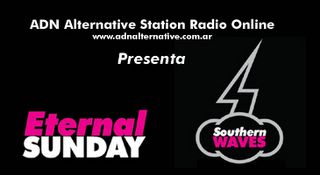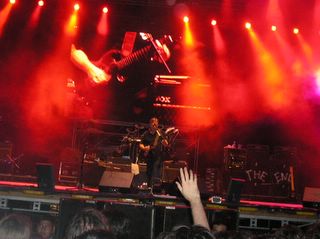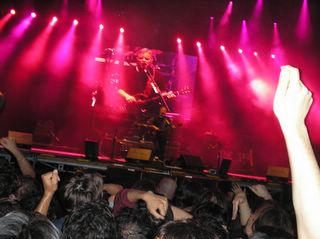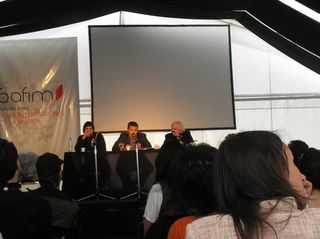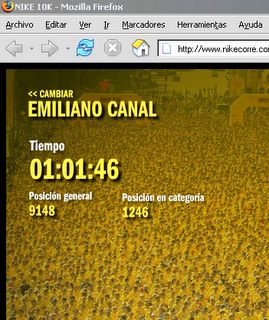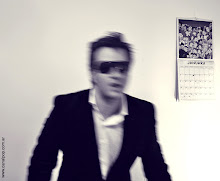Oscar Wilde, quoted by Paul Auster in "Brooklin Follies"
Wednesday, November 29, 2006
Tuesday, November 28, 2006
Wednesday, November 22, 2006
Sunday, November 19, 2006
New Order live in Buenos Aires, November 18, 2006
Finally, after many years of rumors, false information and aborted attempts, New Order came to Buenos Aires to play (the closest they've been was in Brazil). They played at the Personalfest festival. In 2004 I went to see the Pet Shop Boys and in 2005 Duran Duran played there so these guys always bring my favorite artists.
Last year the shows were VERY late, way behind the schedule (partly because someone let Erikah Badu played for hours for a public that was waiting for Duran Duran and didn't even know her). This year, at the main stage there were supposed to play a couple of local bands, Ian Brown (former Stone Roses leader) and finally New Order, at 22:30. Knowing that they'll probably play way later I got there 22:25. The main stage was empty. But after 15 minutes or so a band got onstage… It was New Order! This year the guys kept the schedule it seemed.
I wore a t-shirt that says "London" that a girlfriend brought me from London (did you guess that?), a black velvet-looking shirt, black jeans and decided to wore sneakers instead of my iron-protected construction shoes due to other girlfriend's advice: In this century it's cool to wear small shoes, not huge ones.
I started being a New Order fan in 1989 when my cousin brought me from Sao Paulo a copy of Substance. I loved the album, but couldn't decide if they were a techopop band with some guitars or a guitar-based band with some techno flavor. I guess they never decided that themselves so they kept writing half of the songs in one style and half of the songs in the other (being true that their technopop/ dance oriented stuff brought them the biggest percentage of fans as far as I know). To make the band even more strange, they never appeared in the cover of their albums and never acted like stars, keeping themselves in the background. Many people don't even know how they look like.
Penny Stallings states, in her Rock & Roll Confidential book, that there are two kinds of bands, regardless of the music they make: those who dress like everyday guys and those who wear disguises onstage. New Order clearly belongs to the first group, specially Bernard Sumner, the singer. He wore jeans, a polo shirt, sneakers and acted like the guy next door: he looked like a geography teacher I had in high school. He ACTED like the geography teacher I had in high school. And he and Peter Hook were a little overweighted. Haven't these Manchester guys in their 50's heard of concepts like "diet", "exercise", "beer-induced belly" et al? They're POP STARS for God's sake!
The problem is, Sumner acts like what he probably is: a guitar played that had to replace the lead singer after he killed himself (the singer not Sumner, and I'm talking about Ian Curtis, the singer of Joy Division. New Order was Joy Division and changed the name to New Order after Ian Curtis, the lead singer, hanged himself).
The bass player Peter Hook, on the other hand, tries his best to ACT like a pop star. He wears his hair long and wears chains around his neck. (Unfortunally his beard, the hair and the chains makes him look like a kind of former president of some Abba fan club). He likes to stand at the edge of the stage and play hard his bass, but how cool can you look playing a huge bass with one finger? There's an expression called "guitar hero", and tonight I found why no one talks about "bass hero".
Alright, I'm probably giving the impression that I don't like the band. I love them, only that I can't understand why they keep that shy image.
They started with "Crystal". I was not very close to the stage, but people started jumping in such crazy way that soon I found myself in the AGO27 Area (All Guys Over 27, where neither young kinds nor women can survive). This is, three or four meters away from the band. At that moment I realized that my choice of shoes was wrong: iron-protected shoes would have protected my feet of the hundreds of fans jumping next to me. At the second song, "Regret", a dwarf (I have no other way to call him) jumped and hit his head on my jab. I had to protect my face during the whole show.
After these two known songs they started to play some pre-Substance material, so the people cooled down a little. I didn't even know the songs. They played more old songs from Substance, I think that "Ceremony" or something like that. There was a member of the band (Phil Cunningham??) that alternated between guitar and keyboards. When he was playing guitar I distinctly could hear noises that no one seemed to be playing so I took that some sequencer was leading the band. There was a drummer (I take it was Stephen Morris), playing a drum set that had electronic and acoustic drums, but in the middle of some songs Peter Hook started playing some octapads (that I couldn’t relate to any percussion noise sounding, maybe the channel was muted at the mixer). There's something to be said about Peter Hook: he plays everything with style, he moved his arms like he was playing the ultimate octapad solo. He should have been a member of Emerson, Like and Palmer or a band like that. After the songs he thrown the drumsticks to the public. He spoke a couple of times, but unlike Sumner who speaks with a clear English (as a geography teacher should I guess) Peter speaks with a closed accent and only God knows what he meant.
One thing I noticed: these guys never cared about "vocal arrangements". 99% of the time it was Sumner singing. Hook sung a couple of backing vocals but nothing special. OK, they are not Queen, so let's move on.
They finally played the hits: "True Faith" (that I produced recently for the Southern Waves album, performed by Jorge Vázquez), "Bizarre Love Triangle" (their biggest hit here) and "Blue Monday". When "Blue Monday" started to sound people went crazy and my shoelaces untied so I almost perish under the crowd. They also played a couple of songs from the last album, "Waiting For The Siren's Song" I guess and some other.
For some reason two skinny girls in their 20's managed to get to that point, close to the stage, and sort of kept themselves next to me in order to feel protected (I'm a big guy, thanks). So I ended up holding two skinny girls I didn't even know, while they thanked me for protecting them.
My memories of the band blurred at this point. I vaguely remember a long version of "Temptation" with Peter Hook again at the octapad. Who played the bass?
The band went away. When they came back they played three Joy Division songs, the last one being the hit "Love Will Tear Us Apart". People jumped again. This was the final song, the band went away and the people called them back for a while. When the two skinny girls decided to part I went home. It was midnight, pretty early for Buenos Aires standards for a festival to end (Duran Duran ended at around 4:00 AM I guess). The last member to leave the stage was Peter Hook, and he kicked the octapads away and had a friendly fight with a roady. He definitely doesn't act like a bass player.
Conclusion: This was the first time I saw them live, but I guess this was a typical New Order show. I expected more hits, specially from the Technique era, and the last hits they had ("Jetstream", "Krafty", etc. etc.). But it was cool anyway.
Last year the shows were VERY late, way behind the schedule (partly because someone let Erikah Badu played for hours for a public that was waiting for Duran Duran and didn't even know her). This year, at the main stage there were supposed to play a couple of local bands, Ian Brown (former Stone Roses leader) and finally New Order, at 22:30. Knowing that they'll probably play way later I got there 22:25. The main stage was empty. But after 15 minutes or so a band got onstage… It was New Order! This year the guys kept the schedule it seemed.
I wore a t-shirt that says "London" that a girlfriend brought me from London (did you guess that?), a black velvet-looking shirt, black jeans and decided to wore sneakers instead of my iron-protected construction shoes due to other girlfriend's advice: In this century it's cool to wear small shoes, not huge ones.
I started being a New Order fan in 1989 when my cousin brought me from Sao Paulo a copy of Substance. I loved the album, but couldn't decide if they were a techopop band with some guitars or a guitar-based band with some techno flavor. I guess they never decided that themselves so they kept writing half of the songs in one style and half of the songs in the other (being true that their technopop/ dance oriented stuff brought them the biggest percentage of fans as far as I know). To make the band even more strange, they never appeared in the cover of their albums and never acted like stars, keeping themselves in the background. Many people don't even know how they look like.
Penny Stallings states, in her Rock & Roll Confidential book, that there are two kinds of bands, regardless of the music they make: those who dress like everyday guys and those who wear disguises onstage. New Order clearly belongs to the first group, specially Bernard Sumner, the singer. He wore jeans, a polo shirt, sneakers and acted like the guy next door: he looked like a geography teacher I had in high school. He ACTED like the geography teacher I had in high school. And he and Peter Hook were a little overweighted. Haven't these Manchester guys in their 50's heard of concepts like "diet", "exercise", "beer-induced belly" et al? They're POP STARS for God's sake!
The problem is, Sumner acts like what he probably is: a guitar played that had to replace the lead singer after he killed himself (the singer not Sumner, and I'm talking about Ian Curtis, the singer of Joy Division. New Order was Joy Division and changed the name to New Order after Ian Curtis, the lead singer, hanged himself).
The bass player Peter Hook, on the other hand, tries his best to ACT like a pop star. He wears his hair long and wears chains around his neck. (Unfortunally his beard, the hair and the chains makes him look like a kind of former president of some Abba fan club). He likes to stand at the edge of the stage and play hard his bass, but how cool can you look playing a huge bass with one finger? There's an expression called "guitar hero", and tonight I found why no one talks about "bass hero".
Alright, I'm probably giving the impression that I don't like the band. I love them, only that I can't understand why they keep that shy image.
They started with "Crystal". I was not very close to the stage, but people started jumping in such crazy way that soon I found myself in the AGO27 Area (All Guys Over 27, where neither young kinds nor women can survive). This is, three or four meters away from the band. At that moment I realized that my choice of shoes was wrong: iron-protected shoes would have protected my feet of the hundreds of fans jumping next to me. At the second song, "Regret", a dwarf (I have no other way to call him) jumped and hit his head on my jab. I had to protect my face during the whole show.
After these two known songs they started to play some pre-Substance material, so the people cooled down a little. I didn't even know the songs. They played more old songs from Substance, I think that "Ceremony" or something like that. There was a member of the band (Phil Cunningham??) that alternated between guitar and keyboards. When he was playing guitar I distinctly could hear noises that no one seemed to be playing so I took that some sequencer was leading the band. There was a drummer (I take it was Stephen Morris), playing a drum set that had electronic and acoustic drums, but in the middle of some songs Peter Hook started playing some octapads (that I couldn’t relate to any percussion noise sounding, maybe the channel was muted at the mixer). There's something to be said about Peter Hook: he plays everything with style, he moved his arms like he was playing the ultimate octapad solo. He should have been a member of Emerson, Like and Palmer or a band like that. After the songs he thrown the drumsticks to the public. He spoke a couple of times, but unlike Sumner who speaks with a clear English (as a geography teacher should I guess) Peter speaks with a closed accent and only God knows what he meant.
One thing I noticed: these guys never cared about "vocal arrangements". 99% of the time it was Sumner singing. Hook sung a couple of backing vocals but nothing special. OK, they are not Queen, so let's move on.
They finally played the hits: "True Faith" (that I produced recently for the Southern Waves album, performed by Jorge Vázquez), "Bizarre Love Triangle" (their biggest hit here) and "Blue Monday". When "Blue Monday" started to sound people went crazy and my shoelaces untied so I almost perish under the crowd. They also played a couple of songs from the last album, "Waiting For The Siren's Song" I guess and some other.
For some reason two skinny girls in their 20's managed to get to that point, close to the stage, and sort of kept themselves next to me in order to feel protected (I'm a big guy, thanks). So I ended up holding two skinny girls I didn't even know, while they thanked me for protecting them.
My memories of the band blurred at this point. I vaguely remember a long version of "Temptation" with Peter Hook again at the octapad. Who played the bass?
The band went away. When they came back they played three Joy Division songs, the last one being the hit "Love Will Tear Us Apart". People jumped again. This was the final song, the band went away and the people called them back for a while. When the two skinny girls decided to part I went home. It was midnight, pretty early for Buenos Aires standards for a festival to end (Duran Duran ended at around 4:00 AM I guess). The last member to leave the stage was Peter Hook, and he kicked the octapads away and had a friendly fight with a roady. He definitely doesn't act like a bass player.
Conclusion: This was the first time I saw them live, but I guess this was a typical New Order show. I expected more hits, specially from the Technique era, and the last hits they had ("Jetstream", "Krafty", etc. etc.). But it was cool anyway.
Saturday, November 18, 2006
BAFIM, these are me and Richard Gottehrer with his eyes open now. He wrote a song called "I Want Candy" that was featured at The Simpson's series, sung by the Simpsons. I asked him about it and he said that was one of the things he's really proud about (to have a song sung by the Simpsons). Cool guy. 



BAFIM, conference about digital technologies. The man the mic is Richard Gottehrer, who was a succesful songwriter, co owner of the Sire Records label and now owner of The Orchard digital distribution company. The guy with the cap in front of me is Tweety Gonzalez, famous producer from Argentina and a good friend. 
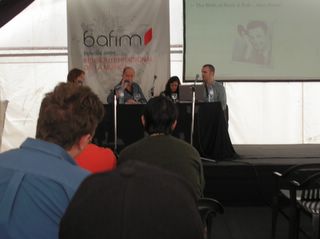


Thursday, November 16, 2006
BAFIM & the music business
I went to the BAFIM music convention today in Buenos Aires. There was a conference about the music business and the way technology is changing:
The guys said that at the beginning (late 19th century) inventors like Edison manufactured devices to reproduce recorded sounds. The business was to sell the devices themselves, not any music. The idea of recording music came later.
When companies started to record music for these devices, there was no standarization. You bought a wax cilynder (or whatever it was) from one manufacturer and you had to play it in the device sold but that same manufacturer in order to listen to it. If you wanted a song that was not in the manufacturer's catalog you had to buy the song AND the hardware to play it from the competence.
And of course, the music was offered as a way to interest people in buying the expensive devices (that were considered almost a piece of furniture).
In a certain moment there was a hardware standarization, meaning that any record player would reproduce any record you bought. This is considered the "real" beginning of the music industry, those days when the money was in selling the records themselves (not the devices that played them).
With the digital technology, everything's changing fast. People are happily downloading mp3's and not buying cd's, and the music business is seriously challenged.
So what happened? The iPod and iTunes and the Zune and the whatever you call them were born. And now again, the money is not in selling the music itself, but the music is offered as a hook to make you buy the iPod (the device).
What's more, every manufacturer is, again, implementing propietary systems in order to make sure you will have to but their productis to reproduce the music.
So we're back in the 19th century/ early 20th century music phase when everyone has a standard of their own and there's more money in selling the hardware rather than the music itself.
I found this interesting...
The guys said that at the beginning (late 19th century) inventors like Edison manufactured devices to reproduce recorded sounds. The business was to sell the devices themselves, not any music. The idea of recording music came later.
When companies started to record music for these devices, there was no standarization. You bought a wax cilynder (or whatever it was) from one manufacturer and you had to play it in the device sold but that same manufacturer in order to listen to it. If you wanted a song that was not in the manufacturer's catalog you had to buy the song AND the hardware to play it from the competence.
And of course, the music was offered as a way to interest people in buying the expensive devices (that were considered almost a piece of furniture).
In a certain moment there was a hardware standarization, meaning that any record player would reproduce any record you bought. This is considered the "real" beginning of the music industry, those days when the money was in selling the records themselves (not the devices that played them).
With the digital technology, everything's changing fast. People are happily downloading mp3's and not buying cd's, and the music business is seriously challenged.
So what happened? The iPod and iTunes and the Zune and the whatever you call them were born. And now again, the money is not in selling the music itself, but the music is offered as a hook to make you buy the iPod (the device).
What's more, every manufacturer is, again, implementing propietary systems in order to make sure you will have to but their productis to reproduce the music.
So we're back in the 19th century/ early 20th century music phase when everyone has a standard of their own and there's more money in selling the hardware rather than the music itself.
I found this interesting...
Wednesday, November 15, 2006
Monday, November 13, 2006
Subscribe to:
Comments (Atom)

